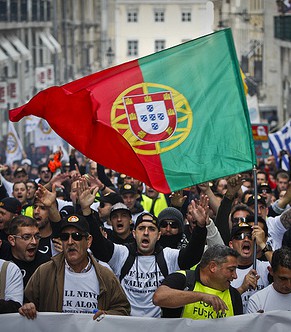Austerity measures might not be a decisive factor to change government.
Portugal, like some other European countries, has been devastated by a terrible economic and financial crisis since 2011. It was then that the so-called “Troika” —the IMF, the European Central Bank and the European Commission—came in to design a rescue plan, following Portugal’s request for financial help. A complete restructuring package was imposed. Health care cuts, social security cuts and labour market restructuring were some of the measures, but salaries and pensions were also targeted. In the meantime, unemployment rose, a vast number of people lost their houses and many youngsters migrated. Today’s 3 million people below the poverty line speak to the Portuguese social situation.
During this period, the Portuguese government was led by a centre-right coalition of Social and Christian Democrats (PSD and CDS). Its leader, Mr. Passos Coelho, in power since 2011, has been systematically endorsing and implementing the Troika’s directives, claiming that the memorandum was part of his own programme and that he would do more than he had been asked to do. And, in fact, it even became his own programme.
Mr. Passos Coelho has been systematically endorsing and implementing the Troika’s directives; it even became his own programme.
Portugal officially ended the harsh austerity measures in 2014, with timid and superficial success. Its finances have been stabilised, unemployment is slightly decreasing and the economic indicators are reticently responding. In a way, the confidence of the international markets has been restored.
Last Sunday, October 4th, the Portuguese had national elections. Seventeen parties entered the fight. Only 6 had possibilities to achieve parliamentary representation: the Coalition of Social and Christian Democrats, the Socialists, the radical left parties (BE and CDU), PAN (a green party) and Livre- a new party also from the radical left. But only the first two envisaged a government position.
Following the social crisis outcry, expectations and predictions reflected the general sentiment that the Socialists would be the next winners. Ever since the campaign started, however, the polls reflected the contrary. Socialists always came after the centre-right coalition and the differences between them continued to increase in favour of the latter. How can we explain that? How can we explain that a country which has suffered a most appalling crisis, whose government has endorsed and overtly proclaimed that it would do more than the imposed austerity measures, is now rewarding the parties (PSD and CDS) that have made the lives of its people so miserable? To answer this question, we have to look inside the Socialist camp, the party that was expected to lead the polls.
The Socialist party has gone through an internal nightmare since 2010. In government when the Troika was asked to step in, it has been blamed for all the country’s misfortunes on grounds of mismanagement and corruption. Internal party politics have also been hard since then. The party not only faced leadership dilemmas but also, in November 2014, the country’s former Socialist prime minister, José Sócrates, was imprisoned for fiscal corruption, remaining in prison ever since.
But the way it conducted its electoral campaign has also been very problematic and, most probably, responsible for the party’s disastrous defeat. I would argue that the Socialists faced three challenges during the campaign: their own internally fractured party, ineffective leadership and fierce warfare from other parties.
To start with, the Socialist party elite has not been entirely convinced by the new leader, Mr. António Costa. Stepping in very late in the process (he was elected secretary-general in November 2014), the former mayor of Lisbon was not able to bring together his fellow Socialists around his proposed government programme. Apart from that, the party has been fractured with factions moving not only to the left and to the right, but also claiming for a generational change. Mr. Costa was not able to bridge that gap.
Adding to this, Mr. Costa has not been able to project leadership convincingly. He has not adequately explained his programme’s social policies, he has not galvanized people, his campaign slogans and messages have not been convincing enough, and his uncharismatic personality has been incapable of bringing people along with him.
The Socialist party has been fractured with factions moving not only to the left and to the right, but also claiming for a generational change. Mr. Costa was not able to bridge that gap.
Last but not least, the Socialists faced fierce opposition from all sides. It is important to remember that an immense number of small parties have been born out of the crisis, particularly on the left side of the political spectrum. During the campaign, the Socialists were severely attacked by all of them. Actually, they were attacked by all parties in the contest, starting by the parties on the left and ending with the government coalition that obviously made them the focus of its critique. Mr. Costa’s reaction was soft.
But there is more to say about the Portuguese political arena. Portugal is a very conservative and traditional country where major changes and adjustments are difficult to achieve. This is explained by the strong rightist structure of the political and social systems, which goes as far back as the dictatorship.
But does this mean that in a period of crisis, Portugal does not want to change? Maybe not. Notwithstanding the fact that the parties in government have won again, as predicted, the political scenario has changed substantially: the centre-right coalition does not have an absolute majority as before, and if the parties on the left of the political spectrum came together they would have an absolute majority. They could even dream of taking over power. This really corresponds to a different scenario.
Having said that, the fact remains: Portugal is the only country going through an austerity programme that hasn’t changed government. Pulling the left together is unlikely. Whether or not the winning coalition will be able to form a stable government, supported by the Socialists, is difficult to tell at this point.
Portugal is the only country going through an austerity programme that hasn’t changed government.
Party politics and voting behaviour are often about perceptions. What the October 4th election results convey is that the Portuguese voters have asked the future centre-right government to face a group of parties on the left of the political spectrum with an absolute majority among themselves in the Portuguese Assembly. So, even if austerity measures haven’t contributed to a governmental change, they have certainly set in motion changes in the future government’s political plans. Without a doubt, nothing will be the same again.
Fernanda Neutel is currently the head director of the first degree course on European Studies and International Relations in the Lusófona University, Lisbon. She holds a PhD in Political Science and a Master degree in International Relations from Leeds University, United Kingdom. She has been lecturing courses on Politics and Policies of the European Union at Master and PhD Level, since 1999. She has recently published a chapter entitled “Pushing the Union Forward? The Role of The European Parliament in the Union’s crisis” in Demetriou, Kyriakos, eds., The European Union in Crisis, Explorations in Representation and Democratic Legitimacy, Switzerland: Springer Verlagen.




